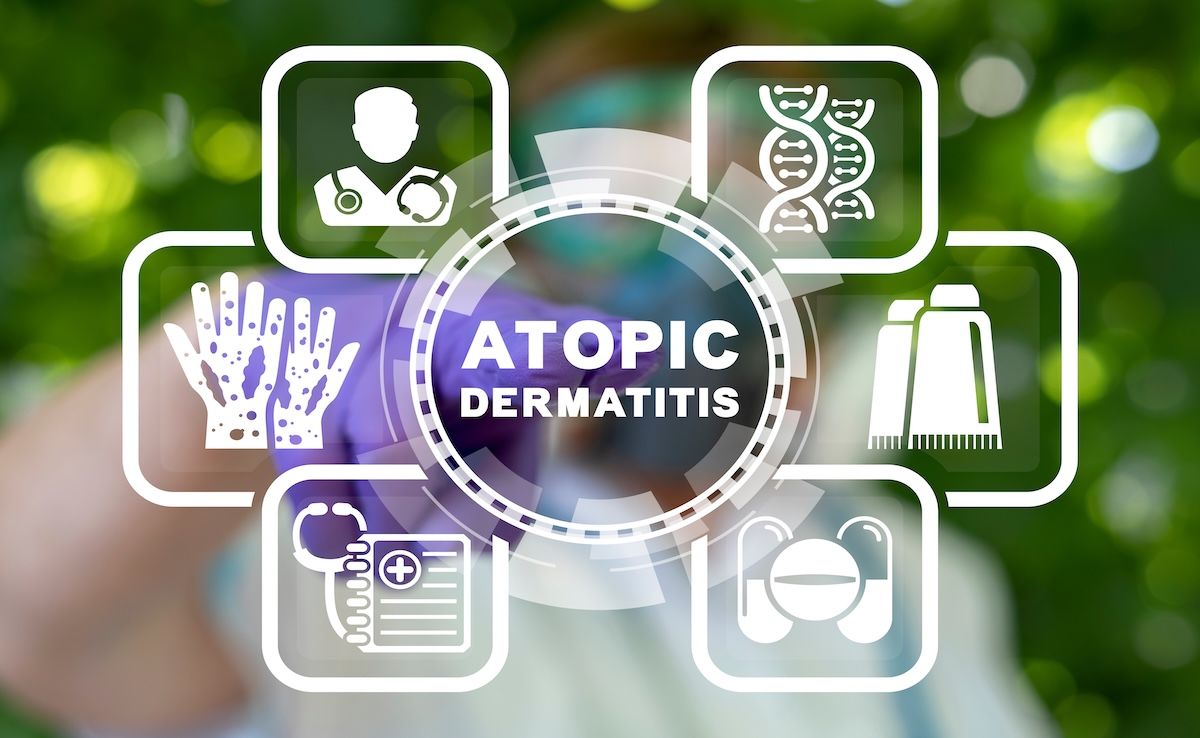- Center on Health Equity & Access
- Clinical
- Health Care Cost
- Health Care Delivery
- Insurance
- Policy
- Technology
- Value-Based Care
Long-Term Lebrikizumab Provides Sustained Skin Clearance in Atopic Dermatitis
In this subanalysis of data from the ADjoin trial of lebrikizumab, the interleukin-13 receptor inhibitor that is also a monoclonal antibody showed itself to be effective over the long term in patients with atopic dermatitis on maintenance therapy.
Of the 181 patients with atopic dermatitis in the ADjoin trial (NCT04392154), 50% were able to maintain long-term skin clearance from using lebrikizumab (Ebglyss; Lilly) out to 3 years, or 152 weeks, according to data presented at the recent Society for Pediatric Dermatology Annual Meeting.1
Additional findings of note in the long-term extension (LTE) analysis are that patients who received 250-mg lebrikizumab every 2 weeks (n = 82) or every 4 weeks (n = 99) achieved EASI-90, at 79.4% and 86.8%, respectively, and that 49.2% and 50.0% achieved EASI-100.
ADjoin is the LTE analysis of deep response maintenance and quality of life in patients originally enrolled in the ADvocate 1 trial (NCT04146363) and the ADvocate 2 trial (NCT04178967). In these trials, the primary outcomes measured from baseline to week 16 were percentage of participants with an Investigator Global Assessment (IGA) Score of 0 or 1 and a reduction of at least 2 points as well as percentage of participants achieving Eczema Area and Severity Index (EASI-75; ≥75% reduction in EASI score).2-3 Both were randomized, double-blind, placebo-controlled, parallel-group analyses vs the LTE analysis in which participants are blinded or not blinded according to their parent study assignment.2-4
Baseline characteristics varied between the original analyses and the LTE study. Mean (SD) ages, EASI and Patient-Oriented Eczema Measure (POEM) scores, disease duration, body mass index, and percentage of patients from Europe were close to equal; however, the LTE study had fewer adolescent and female patients, as well as participants from the US and the rest of the world.
The interleukin-13 receptor inhibitor that is also a monoclonal antibody administered subcutaneously was effective over the long term in patients with atopic dermatitis on maintenance therapy. | Image Credit: © wladimir1804-stock.adobe.com

Overall, in addition to the results above, the following significant patient improvements were seen with 3 continuous years of treatment (52 weeks in the original trials through 152 weeks in the extension trial):
- Despite response rates that varied for both doses (250 mg every 2 weeks or every 4 weeks) from week 52 to week 104, continuous improvement was seen in IGA 0 response rates at the every-2-weeks 250-mg dose of lebrikizumab for weeks 104 through 152 while response to the every-2-weeks 250-mg dose peaked at week 128
- EASI-90 rates were consistently high for the duration of the LTE analysis, ranging from 78.4% to 79.4% for the every-2-weeks dose and 78.2% to 86.8% for the every-4-weeks dose
- EASI-100 rates were also consistently high, but demonstrated significantly greater improvement from week 52 through week 152 compared with EASI-90: total patients achieving this milestone rose from 36.4% to 49.2% in those on the every-2-weeks dose and from 30.7% to 50.0% in those on the every-4-weeks dose
Need for rescue therapy was also investigated, with this treatment used concomitantly during the treatment period. Totals of 96% of patients receiving 250-mg lebrikizumab every 2 weeks and 91% every 4 weeks did not require any systemic rescue treatment; 94% and 95%, respectively, did not require topical calcineurin inhibitors at any point; and 90% and 86% did not require any topical corticosteroids during the LTE analysis.
POEM scores were either maintained or improved for both patient groups throughout the extension study period. In the every-2-weeks group, total patients responding rose from 20.5% to 24.0%, and from 18.8% to 32.7% in the every-4-weeks group.
To be included in the LTE analysis, patients had to complete either of the parent studies and the last patient visit in those trials; they were excluded from the LTE analysis if they experienced a serious adverse event that led to treatment discontinuation or if they met conditions for discontinuation according to the investigator or sponsor, which included noncompliance and incomplete study assessments.
“These 3-year data suggest that long-term maintenance of total skin clearance is an achievable treatment goal for at least half of lebrikizumab week 16 monotherapy responders,” the study authors concluded.
References
- Simpson E, Biedermann T, Kircik L, et al. Raising the bar of efficacy in atopic dermatitis: lebrikizumab maintains depth of response over 3 years in week 16 responders. Presented at: Society for Pediatric Dermatology Annual Meeting; July 23-26, 2025; Seattle, WA. Poster POS-11.
- Evaluation of the efficacy and safety of lebrikizumab (LY3650150) in moderate to severe atopic dermatitis (ADvocate1). ClinicalTrials.gov. Updated November 30, 2022. Accessed August 5, 2025. https://clinicaltrials.gov/study/NCT04146363
- Evaluation of the efficacy and safety of lebrikizumab (LY3650150) in moderate to severe atopic dermatitis (Advocate2). ClinicalTrials.gov. Updated May 24, 2023. Accessed August 5, 2025. https://clinicaltrials.gov/study/NCT04178967
- Long-term safety and efficacy study of lebrikizumab (LY3650150) in participants with moderate-to-severe atopic dermatitis (ADjoin). ClinicalTrials.gov. Updated August 3, 2025. Accessed August 5, 2025. https://clinicaltrials.gov/study/NCT04392154
